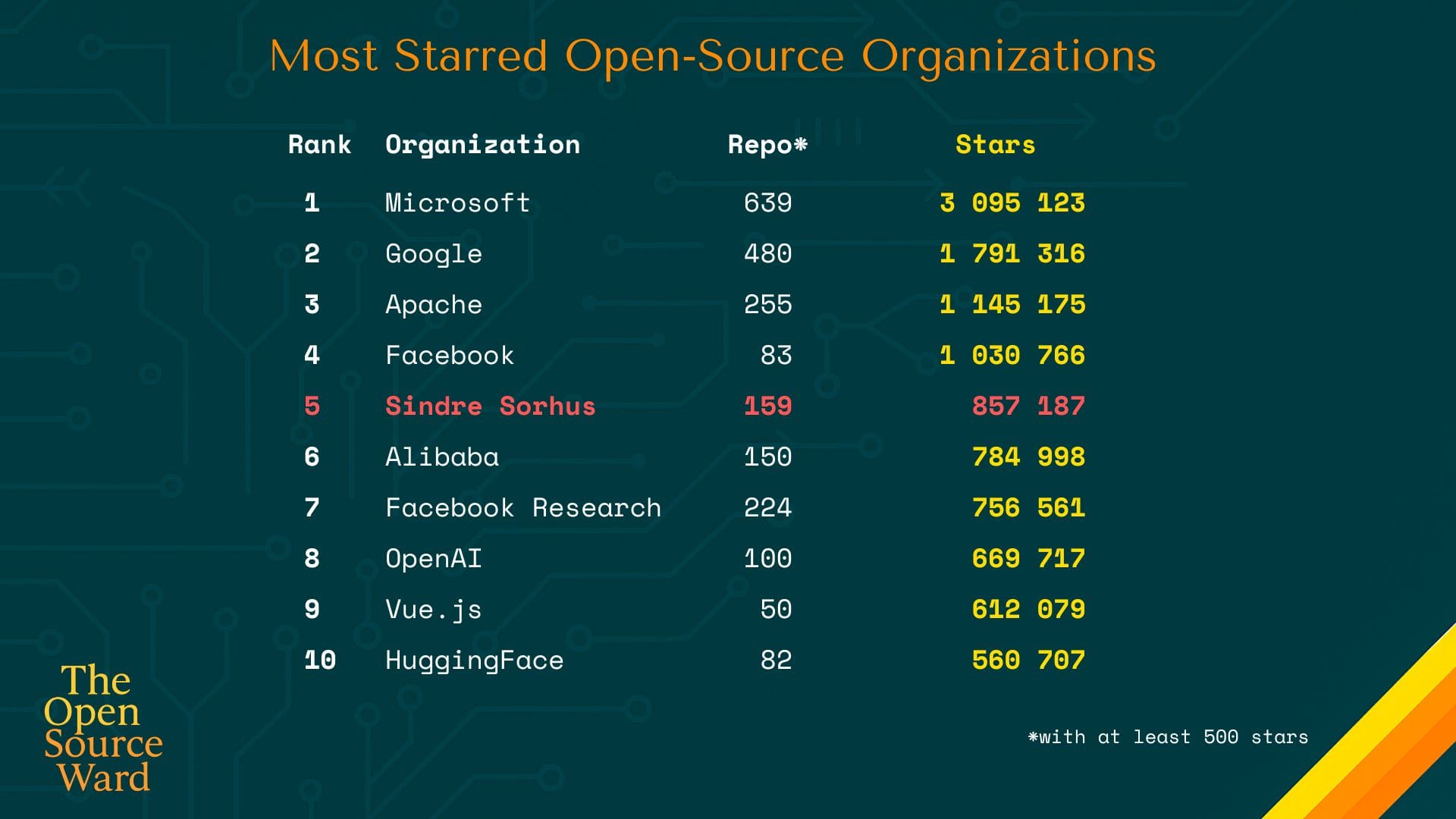The Indie Dev Outshining Tech Giants on GitHub
Recently, I was browsing the top GitHub organizations, and something quickly caught my attention.

Who the fuck is Sindre Sorhus?
All of the names in this top 10 are related to massive global tech companies (Microsoft, Google, Facebook, Alibaba, OpenAI) or well-known open-source organizations (Apache, Vue.js, Hugging Face). Except, in fifth place, is Sindre Sorhus, an independent Norwegian open-source developer.
With an impressive total of 857,187 stars across 159 repositories, each with at least 500 stars, he certainly has remarkable stats! So let's discover Sindre Sorhus together.
A Norwegian dev living in Thailand
Sindre grew up in suburban Oslo, Norway, where his childhood fascination with Legos sparked his interest in building things [1] (trust me, this is important for what comes next). He quickly got into programming thanks to the "view source" button in browsers and its tendency to unpack and reverse engineer flash apps (rip Miniclip games).
After high school, Sindre was conscripted into the Norwegian military, where he joined the media unit working on intranet projects. He discovered Python and Django, which provided the structured learning he needed compared to his previous experience of copying and pasting PHP and JavaScript code. This military experience led to a five-year career with the Cyber Defence Unit, where he worked as a front-end developer and photographer.
Now that the stage is set, it’s time to get into the exciting part.
Transition to Open Source Development
Sindre's open source journey began around 2012 [2] when he discovered TodoMVC - initially attracted by its appealing logo design. He contributed a jQuery application to the project, which was quickly merged by maintainer Addy Osmani. This positive experience led to his deeper involvement in the project and eventually to collaboration on Yeoman when Osmani joined Google.
In 2014, he quit his office job to backpack around Southeast Asia while continuing to work on open source. He has been doing open source full-time since then.
A Glimpse into Sindre's Contributions
Sindre joined GitHub on December 20, 2009, and opened his first issue in July 2012. Since then he published 1100+ open source repositories and maintain 1200+ npm projects , and you probably have some of them in your dependency tree. For example, Webpack relies on 101 of its packages and Babel relies on 144.
His most starred repositories are the "awesome" ones, which are lists of useful and awesome resources related to a given topic, such as:
- awesome | 395K+ ⭐ | lists about all kinds of interesting topics
- awesome-nodejs | 62K+ ⭐ | Node.js packages and resources
- awesome-electron | 26K+ ⭐ | Useful resources for creating apps with Electron
Each of the aforementioned repositories can be considered a diverse and curated library of resources centered around a specific topic, often proving to be quite handy.
But this is just the tip of the iceberg. Most of Sindre's contributions are related to the JavaScript or macOS ecosystem, with the publication and maintenance of hundreds of npm packages and CLI tools.
His creations are designed to be modular components that work like Lego bricks to build larger applications. This tendency is at the heart of his profusion of repositories.
Living as a full time open-source web-developer
Sindre is no longer backpacking, but he’s still working on open source full-time [3]. Since early 2018, he is fully funded by the community. His list of sponsors ranges from notable tech companies like Retool, Indeed, ESLint, and Airbnb to individual contributors.
The hidden infrastructure
Sorhus’ impact extends far beyond star counts. His work represents the often-invisible infrastructure that powers modern web development. While framework authors and company-backed projects often get the spotlight, developers like Sorhus build the foundational tools that make everything else possible.
I don’t want you to focus only on the numbers. Yes, the stats are impressive, but Sindre is just the tip of the iceberg when it comes to open-source contributions shaping the software development world.
His story shows how individual contributors can achieve outsized impact through consistency, quality, a deep understanding of developer needs, and not to forget a healthy dose of passion for reusable components and LEGO-like building blocks.
This article is based on publicly available information, interviews, and GitHub activity data. Star counts and statistics are current as of August 2025.
Member discussion